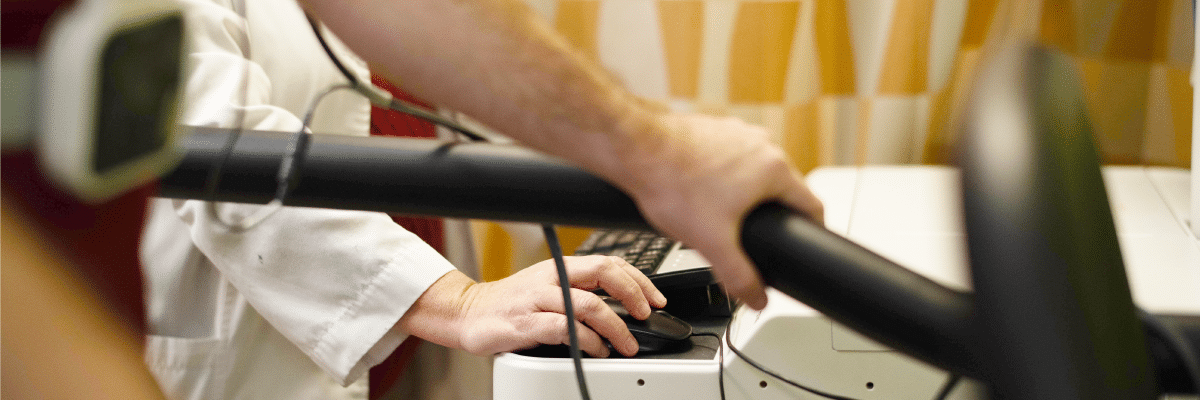Heart & Vascular Tests and Diagnostics

Diagnose and Screen
When a patient’s symptoms – such as shortness of breath, chest pain, chest pressure, heart tremors, dizziness, sweating, numbness, and weakness – suggest a heart or blood vessel problem, we run a series of tests to diagnose and screen for cardiovascular conditions. Usually, diagnosing a cardiovascular problem requires a combination of blood tests, heart monitoring, and imaging tests.
These tests can tell us a lot about the heart’s electrical activity, heartbeat rhythm, how well blood is pumping, how easily blood is flowing through the arteries and veins, and whether there are any abnormalities in the cardiovascular system. Some tests can even record heart activity to help us determine whether specific activities may be contributing to symptoms.
Our Services
We offer a full range of cardiovascular tests:
- Electrocardiography (EKG) measures the heart’s electrical activity using electrodes placed on the skin of the limbs and chest.
- Echocardiogram (ECHO) is an ultrasound of the heart. The image is made using standard ultrasound or Doppler ultrasound.
- Electrophysiology study (EPS) is a test to measure the electrical activity of the heart and to diagnose arrhythmia or abnormal heart rhythms.
- Holter or Cardiac Event Monitors record the same measurement of ECG is one of the simplest and fastest tests used to evaluate the heart.
- Vascular, Transesophageal Echocardiography (TEE) creates pictures of your heart chambers and valves using high-frequency sound waves. It produces more detailed images than a traditional echocardiogram can provide. It may also be used during surgery.
- Exercise Stress Test, also known as a stress test, physical activity like vigorously walking on a treadmill. It can reveal problems with blood flow within your heart.
- Nuclear Stress Test is an imaging study that uses radioactive material to show how well blood flows into the heart muscle, both at rest and during activity. It provides more information than a standard exercise stress test.
And, a full range of cardiovascular imaging:
- Cardiac calcium scoring, also known as a heart scan or calcium score, is a non-invasive computed tomography (CT) scan of the heart, used to calculate your risk of developing coronary artery disease by measuring the amount of calcified plaque in the coronary arteries.
- A computed tomography (CT) coronary angiogram is an imaging test that looks at the arteries that supply blood to your heart. It uses a powerful X-ray machine to produce images of your heart and blood vessels. The test can be used to diagnose the cause of chest pain or other symptoms.
- Cardiac magnetic resonance imaging (MRI) uses a powerful magnetic field, radio waves, and a computer to produce detailed pictures of the structures within and around the heart.
- Coronary angiography uses contrast dye, usually containing iodine, and x-ray images to detect blockages in the coronary arteries that are caused by plaque buildup.
- Vascular ultrasound is a noninvasive ultrasound used to examine the circulation in the blood vessels. Vascular ultrasound can be used to evaluate arteries or veins in nearly any part of the body, including blood vessels in the neck, abdomen, arms, and legs.
Locations and Directions
-
Grady Memorial Hospital
80 Jesse Hill Jr Drive SE
Atlanta, GA 30303Heart & Vascular Center - 2nd Floor -
Asa G. Yancey Health Center
1247 Donald Lee Hollowell Pkwy NW
Atlanta, GA 30318 -
Camp Creek Comprehensive Care Center
3896 Princeton Lakes Way
Atlanta, GA 30331 -
Kirkwood Health Center
1863 Memorial Drive SE
Atlanta, GA 30317
Why Choose Us
Grady’s cardiovascular testing and diagnostic facilities are newly remodeled and feature state-of-the-art technology to perform the most sensitive tests available, in order to precisely diagnose a patient’s condition.
We have consistently invested in better testing capability because it helps us to better understand the nuances of a patient’s conditions, which leads to more efficient, effective treatment.
Appointments and Referrals
Grady’s Heart & Vascular Center accepts new patients with referrals from either primary care providers or other specialists. Please ask your provider to use our patient referral checklist and email us the details. We will contact you to schedule an appointment.
If you are an existing Grady patient and have a MyChart account, visit MyChart or call our scheduling line at (404) 616-1000, to make an appointment.
Our Doctors
Every hospital treats patients. At Grady, we strive to treat them better, more efficiently, and effectively. Our mission to care for all who need us attracts cardiovascular specialists from across the nation. They are drawn here by the knowledge that we test the limits of medicine by innovating existing standards of care, researching cutting-edge drugs and therapies, and exploring novel treatments.
Our zeal for innovation has given Grady a national reputation for medical advancement in areas like cardiovascular disease, cancer, burn, stroke, diabetes, infectious diseases, women’s health, sickle cell, and other conditions cared for by specialists in our centers of excellence. Access to all of these accredited practices is available to every Grady patient, and our collegial environment means that specialists routinely help to care for their colleagues’ patients.
Though clinicians are drawn by Grady’s reputation, most are employed by the Emory and Morehouse schools of medicine, which staff our medical services. Grady is one of a handful of U.S. health systems whose patients are cared for by faculty members of two medical schools. This reinforces our commitment to ongoing innovation.
